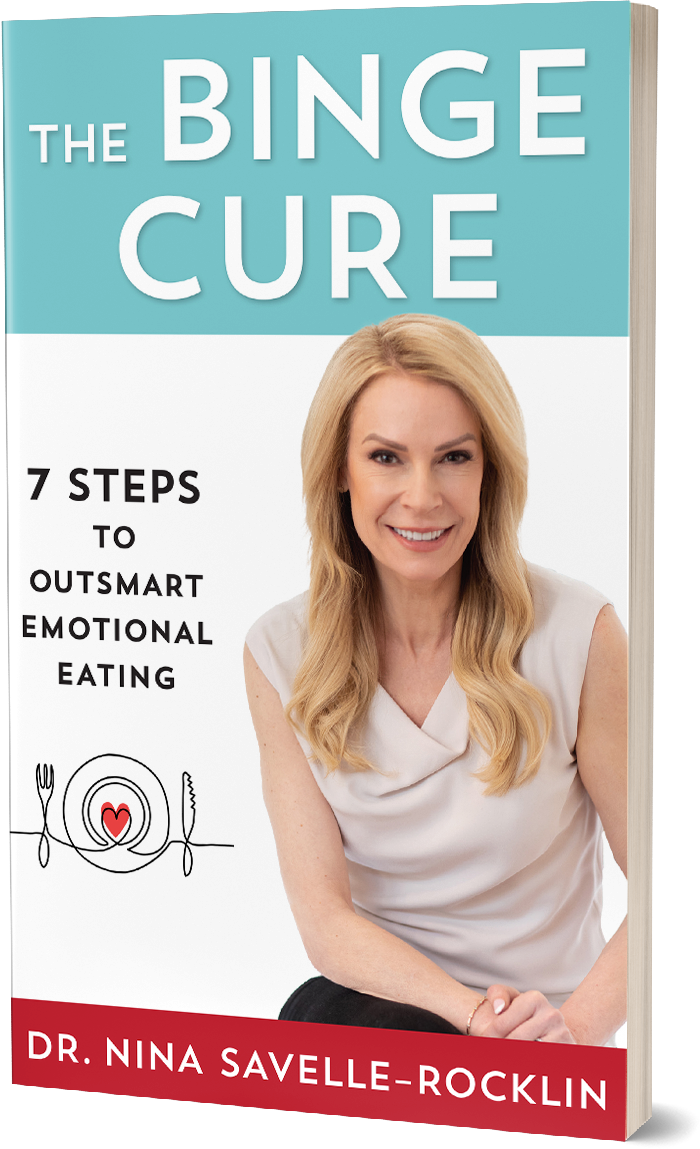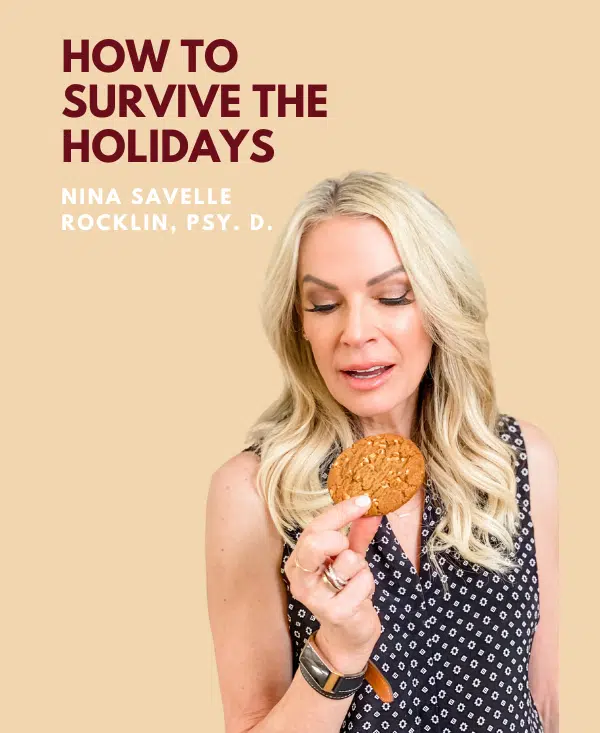Dr. Nina Savelle-Rocklin
The Power of Self-Love: 7 Strategies for Happiness on Valentine’s Day & Beyond
Table of Contents
Valentine’s Day is a day to celebrate love. For some, it’s a special day dedicated marked by gifts such as chocolates, flowers, cards, and a special meal together. For others, it’s a day of sadness because they’re single or unhappy in their relationship.
No matter what your circumstance, it’s important to show yourself some kindness on Valentine’s Day and every day.

The dark side of Valentine’s Day
If Valentine’s Day is difficult for you, you’re not alone. Being surrounded by images of love and happiness, as well as the focus on chocolate and special meals, can trigger sadness and a sense of loss.
- Lack of a romantic partner: For those who are single, Valentine’s Day can serve as a reminder of their solo status, leading to feelings of loneliness and sadness, and fears that nothing will ever change. This leads to feelings of emptiness, loss, sadness, and anxiety.
- Struggles in a current relationship: For those in a relationship that’s not going well, with issues, or if they’ve lost that loving feeling, Valentine’s Day can be stressful. The juxtaposition between how they want to feel and how things can be painful. There may also be pressure to make the day special, which can lead to disappointment if reality doesn’t meet those expectations.
- Memories of past relationships: For those who had love and lost it, Valentine’s Day can bring on feelings of sadness and grief.
- Social comparisons: Seeing others celebrate their love and affection on social media often leads to feelings of inadequacy and low self-esteem. It’s important to remember that what we see on the outside is rarely an accurate reflection of what’s happening on the inside.
- Loneliness: For those who don’t have a partner or haven’t yet found someone special, Valentine’s Day can be difficult. Some people question their lovability or feel hopeless about finding that special person.
- Financial constraints: For those who may not have the financial means to celebrate Valentine’s Day with a special gift or date, the holiday can feel disappointing and highlight perceived inadequacies.
- Personal beliefs: Some people may not believe in the commercialization and societal expectations surrounding Valentine’s Day, leading them to feel disillusioned or disconnected from the holiday and, therefore, from other people.
Interestingly, the origins of this holiday highlight its bittersweetness. This holiday started with Saint Valentine, a Catholic priest imprisoned for secretly performing marriages against the orders of the Roman emperor. The legend is that Saint Valentine fell deeply in love with the jailer’s daughter. Before his execution, he sent a love note to her, signing it, “from your Valentine.”
If you’re alone on Valentine’s Day or unhappy in your current relationship, think of this day as a perfect time to cultivate a more loving attitude toward yourself. That means honoring your thoughts, emotions, wishes, and needs.
Being sweet to yourself makes it easier to create healthier habits, have more meaningful relationships and work, and enjoy an increased sense of well-being and self-esteem. When you feel good in your life, you won’t use food for comfort or distraction.
How to love yourself on Valentine’s Day (and every day):
Embrace your individuality
As Theodore Roosevelt once said, “Comparison is the thief of joy.” Individuality is a concept that is often celebrated in modern society, but for many of us, embracing our individuality can be challenging, especially in this age of social media when it’s easy to compare our lives, bodies, homes, and achievements to others.
The first step to embracing your individuality is recognizing your uniqueness. This can be tough to think about if you’ve been raised in an environment where conformity is encouraged or expected. We live in a society that often tells us there’s only one way to have a “good” body or only one way to be attractive. Let’s challenge that and by acknowledging and accepting these differences and celebrating what makes us special.
Staying true to yourself means not trying to conform to the expectations of others and not changing ourselves to please other people.
It means pursuing your passions and interests and taking the time to develop those skills and talents. Whether it’s art, music, writing, or any other pursuit, doing what you love helps you feel more confident and empowered in your daily life.
By recognizing and celebrating your unique qualities and talents, you gain self-confidence and empowerment and feel more comfortable in your own skin. Remember, you’re the one who ultimately knows what’s best for you and what’s right for you. Practice listening to that inner voice that knows your value, and then start turning up the volume.
Be kind to yourself
We often default to self-criticism and negative self-talk, focusing on our failures and shortcomings rather than our strengths and accomplishments. This has a significant impact on our self-esteem and overall happiness. It can lead to bingeing or using food just to escape our own critical voice.
Since you can’t hate yourself into loving yourself, being kind to yourself is one of the most important things we can do for ourselves. Yet, for many of us, this is easier said than done.
One of the most important steps in being kind to ourselves is to recognize our strengths and accomplishments. It’s easy to get caught up in negative thoughts and focus on what we haven’t achieved or what we’re not good at. Acknowledging your strengths, accomplishments, and the qualities you like about yourself can boost self-esteem and help you feel more confident about yourself.
Another important aspect of being kind to ourselves is to focus on progress rather than our failures or perceived shortcomings. It’s natural to feel discouraged when things don’t go as planned or when we make mistakes. But, by focusing on progress, we can see our failures as opportunities for growth and improvement rather than as insurmountable obstacles.
It’s also important to engage in positive self-talk. That means speaking to ourselves in a way that is supportive, encouraging, and compassionate. Avoid harsh, critical statements, and instead, focus on what you’ve achieved, what you’re proud of, and what you like about yourself. Be mindful of the language you use when talking to yourself, and avoid negative words and phrases. One shortcut is to think about this: if you wouldn’t say something to a child, a friend, or anyone you love, don’t say it to yourself.
Be compassionate and treat yourself with the same kindness and understanding that you would extend to a friend or loved one. Acknowledge your feelings instead of ignoring or dismissing them. Be patient with yourself. We’re all human and, therefore, perfectly imperfect.
Another aspect of being kind to ourselves is to set realistic expectations and avoid setting ourselves up for failure. This means not setting overly high goals and instead focusing on small, achievable steps. It also means being mindful of the expectations of others and not taking on too much or feeling like we have to please everyone. Be kind to yourself and make kindness and self-compassion a priority today and every day.
Practice self-care
Self-care is a crucial aspect of overall well-being and a vital part of creating and maintaining a healthy and balanced life.
Self-care is more than caring for your body. In today’s fast-paced world, many of us are caught up in the demands of work, family, and other responsibilities, leaving us little time to focus on our own needs. This leads to stress, exhaustion, and burnout, which can impact our health, happiness, and relationships. For example, if you’re depleted because you’re taking care of everyone else, food can be what’s taking care of you. Feelings of emptiness can also be symbolically filled by bingeing to fill the void.
Self-care can help combat these negative effects by providing a much-needed break from the demands of daily life. It allows us to recharge our batteries, focus on our needs, and engage in activities that bring us joy and fulfillment.
There are many kinds of self-care. For some people, self-care is body-centered and means yoga, running, or hiking. These activities not only improve physical health but they also provide an outlet for stress and tension, allowing us to clear our minds and focus on the present moment.
Self-care may also involve creative pursuits, such as writing, painting, or playing an instrument. Engaging in creative activities allows us to tap into our imagination and express ourselves in new and exciting ways.
Relaxation-based forms of self-care include reading, meditating, or taking a relaxing bath, all of which provide a much-needed break from the daily grind. These activities allow us to unwind and relax, reducing stress and anxiety levels. When you’re feeling relaxed, you’re less likely to turn to food as a way of coping with the intensity of life.
It’s also important to consider emotional and mental self-care. This can include activities such as therapy, journaling, or talking to a trusted friend or family member. By addressing our emotional and mental well-being, we can better understand and cope with our feelings and emotions, leading to improved overall health and happiness.
Remember that self-care is not a one-time event but a continual practice. It’s essential to make self-care a priority and to set aside time for yourself regularly. That means scheduling time for self-care into your daily routine or dedicating a specific day each week to self-care activities.
So go ahead, take care of yourself, and make self-care a priority today and every day.
Surround yourself with the right people
Our friends and loved ones can make all the difference in our lives. We feel our best when we have relationships that give us strength, hope, inspiration, and comfort. On the other hand, toxic relationships can bring us down and drain our energy. That’s why it’s essential to focus on building strong, healthy connections with the right people.
The first step to creating change is to identify toxic relationships, those that make you feel bad. If someone constantly brings negativity into your life, criticizes you, or makes you feel bad about yourself, then it’s time to consider whether this relationship is worth maintaining.
Once you identify toxic relationships, figure out how to manage them, either by ending the relationship or limiting the time you spend with those people.
The next step is to build strong, healthy connections with the right people. This means seeking out and spending time with people who support, encourage, and uplift you. They may be friends, family members, coworkers, or romantic partners who bring positivity into your life and make you feel good about yourself. Building those relationships takes time and effort, and the rewards are well worth it. They bring sweetness into your life that’s way better than chocolate.
How do you find new, awesome people? Start by exploring your interests and hobbies and finding groups or communities that align with them. For example, you can join a sports club, attend meetups for your favorite hobby, or volunteer for a cause you care about. Another option is to take classes or attend workshops in areas that interest you, to meet like-minded people.
Don’t be afraid to step outside your comfort zone and make the first move to strike up a conversation. With a little effort and a positive attitude, you’ll be well on your way to finding new, amazing friends who bring sweetness into your life.
Also, be sure to show up authentically. This means not only offering support and encouragement and listening to others but allowing them to be there for you. Take a chance and share your true feelings, thoughts, and needs.
Don’t pretend everything is okay when you’re struggling. That’s how you build trust and strengthen your connection with others. When you’re honest and open, you create a safe and supportive environment that can help the relationship grow and thrive.
Keep in mind, when we have satisfying, fulfilling relationships, we don’t use food as a substitute when we’re lonely.
Set boundaries
Setting boundaries involves recognizing and communicating your limits and needs to others and making decisions that align with your values and well-being. This can be challenging for many people, especially if it’s hard to say “no” to other people’s wishes.
The first step in setting boundaries is to understand what they are and why they’re important. Think of boundaries as invisible lines that define what you’re comfortable with and what you’re not. They help you communicate your needs and limits to others and protect your time, energy, and peace of mind. Establishing clear boundaries shows others that you respect yourself and your needs.
One reason it’s difficult to say “no” is a fear of hurting other people or possibly damaging a relationship with them. Setting boundaries is not about being selfish or unkind. Instead, it’s about being honest and assertive about your limits and your own needs. When you set boundaries, you’re taking care of yourself.
Take some time to think about what’s important to you and what activities or commitments you want to prioritize. Ask yourself questions like: What do I need to feel fulfilled and happy? What are my non-negotiables? What activities or commitments drain my energy or cause me stress? This helps you determine what types of boundaries you need to set.
Once you’ve identified your values and priorities, it’s time to set those boundaries. This can involve saying “no” to commitments or requests or speaking up for what you want or need. Here are some tips for setting boundaries:
- Practice assertiveness: Assertiveness is the ability to express your needs and opinions in a confident and respectful manner. When setting boundaries, it’s important to be assertive and clear about your needs without being aggressive or passive.
- Use “I” statements: When communicating boundaries, use “I” statements instead of “you” statements. For example, instead of saying “You’re always asking me to do things I don’t want to do,” try saying “I need to prioritize my time and energy, and I’m not able to do everything that’s asked of me.”
- Be proactive: Don’t wait for others to cross your boundaries – proactively communicate your needs and limits to them. For example, if you don’t want to work overtime, let your boss know in advance.
- Be open to compromise: While it’s important to stick to your boundaries, it’s also important to be open to compromise. If someone makes a request that you’re not comfortable with, try to find a solution that works for both of you.
Setting boundaries is an important aspect of self-care and personal growth, and it’s a meaningful way to be loving to yourself.
How to Enjoy Valentine’s Day without Candy
Valentine’s Day is supposed to be a day to celebrate love. Often that means chocolates and flowers and fancy dinners. If that’s not your thing, here are five ways to think outside the box:
Re-evaluate your concept of “romantic love”: For some people, the idea of romantic love is associated with grandiose gestures and cheesy gifts. While it’s great to receive those things once in a while, take this opportunity to think about what true romantic love means to you, and look for ways to convey that all year round instead of just once every February 14th.
Take the focus away from material goods: On Valentine’s Day in particular — when so much emphasis is placed on buying expensive chocolates, flowers, jewelry, and fancy dinners — it’s important to remember there are other ways to show appreciation without breaking your budget (or even spending money at all). Why not try writing each other heartfelt letters or making something special together?
Don’t forget about your friends this Valentine’s day! Let them know how much you appreciate them by sending cards or expressing appreciation (like an invitation for coffee or a heartfelt text). Or better yet — organize an event for everyone in your friend group so that you can all spend quality time together.
Be creative with date night ideas: If going out seems boring or intimidatingly expensive, why not plan a romantic stay-at-home date night? You can create DIY spa treatments, play board games together, and watch classic movies by candlelight…the options are limitless.
Whether you’re solo on Valentine’s day or with friends and loved ones, give yourself the best gift of all on Valentine’s Day—the opportunity to show yourself some love and kindness Celebrate by doing something that brings joy into your life and make this holiday an inspiration for self-compassion and love every single day. You deserve it!
Ready to transform your relationship with food?
Join Dr. Nina's newsletter and receive:
• Expert tips on overcoming emotional eating
• Strategies for sustainable weight loss
• Exclusive content not found anywhere else
Don't miss out on the latest breakthroughs in binge eating!
The Author

Dr. Nina Savelle-Rocklin is a renowned author and podcast host and one of the nation’s leading psychoanalysts known for the psychology of eating. Her signature message of, “It’s not what you’re eating, it’s what’s eating ‘at’ you” has resonated with hundreds of thousands of listeners from around the globe in 40 countries. As founder of The Binge Cure Method, she guides emotional eaters to create lasting food freedom so they can take back control of their lives and feel good in their bodies.
Related Blogs
















